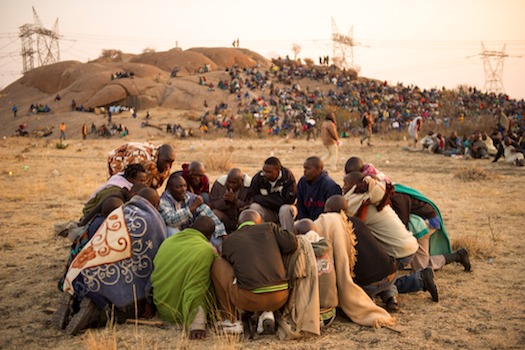- About
- Topics
- Story
- In-Depth
- Picks
- Opinion
- News
- Donate
- Signup for our newsletterOur Editors' Best Picks.Send
Read, Debate: Engage.
| February 19, 2018 | |
|---|---|
| topic: | Child rights |
| tags: | #BABIES BEHIND BARS, #Africa, #human rights, #Romy Titus |
| located: | South Africa |
| by: | Bob Koigi |
But Babies Behind Bars, a South African based organization is working to reverse the sorry state of affairs, ensuring that the formative years that the babies spend with their mothers are decent, healthy and contribute to their overall well-being.
Celebrated South African journalist Romy Titus who started the organization over ten years ago talked to FairPlanet about the motivation behind the noble cause, the hundreds of babies and mothers’ lives it has impacted and the dream of scaling the initiative across the continent.
FairPlanet: What was the inspiration behind the Babies Behind Bars Initiative?
Romy Titus: I did a story years ago on children living behind bars for prime time news of the media organization I was working for. It was one of the most moving pieces in my career and there was this burning desire to help them. Usually, a mother and her baby are allowed to live together in prison for two years before the child is released to the outside world. But those two years are very tough for mothers and equally for the toddlers struggling to make sense of life. I decided to do something about it and that is how Babies Behind Bar initiative was conceived.
How exactly does it work?
We take care of the basic human needs of the children who are born in prison so anything to assist the mother raise her baby to be happy and healthy. Disposable nappies, toys, toiletries, outdoor playgrounds and clothing. We are also in the process of running programs that contribute to the general well-being of these mothers and children allowing them to live a decent and fulfilling life.
Why does this matter to you?
My greatest conviction is that it is everyone’s responsibility to keep the circle of giving going. We live so much for ourselves every day that we rarely look beyond us to see how we can better the life of someone else. I believe and live by the mantra ‘in giving we receive.’ Giving back should matter to everyone.
What is your current reach and how is the reception from the mothers and the prisons departments?
We are operational in 17 prisons in South Africa and 4 beyond the borders of South Africa. The reception has been wonderful by the mothers and the prisons administration. We are also glad that the situation has become very favourable and babies now have access to all things that keep them busy and happy.
Having interacted with the babies in prison and their mothers what do you think is the ideal situation in raising children of female prisoners?
There is no ideal situation, not if you’re in prison or on the outside. There are so many social ills and there is so much worry in today’s world when it comes to raising children that I think whatever happens to you, you must make the most of it no matter the circumstances. These mothers are doing just that. It is too late to erase the past or turn back the hands of time, but the time the mothers in prison have, they want to make it extra special and want every second to count with their children.
In the many years you have been doing this, what is the one most memorable moment or instance?
This has been the wind in my sails. The little we have to give and the joy of the children and their mothers as they receive what we give them is a moment I live for every day, and that is what makes the giving even more worthwhile.
What is the toughest thing about this initiative?
The toughest part is having mom and baby part ways at 2 years. It’s a sad sight for everyone involved and more so the baby whose entire life has been behind bars. To see them go is great but the concern for their wellbeing on the outside is another when they have no clue what the outside world looks like.
One school of thought posits that children born by incarcerated mothers should be placed under foster care to protect them from the mental and emotional torture of growing in prisons and give them a sense of a home environment. What is your take?
Again no ideal situation. And who are we to rob a mother from bonding with her child. Every mother deserves that right whether they are a criminal or not. Mom and baby sections in prisons don’t reflect prisons anymore so that is a plus in a situation like this.
In terms of policy and legislation, what do you think the government ought to do?
I don’t think the government should do anything per se. Sometimes we are quick to criticize the government and apportion blame yet a little effort by each and every one of us is enough to make a huge difference. They say it is the little things that matter and my focus is on how I can work with like-minded people to bring change without always waiting on the government.
What is the ultimate plan with this initiative?
Our mission is to be in every prison on the African continent that houses mothers and children.
By copying the embed code below, you agree to adhere to our republishing guidelines.
